Your Path to Police Academy: How to Get In
Did you know that over 12,000 individuals apply to police academies across Canada each year? With a limited number of spots available, the competition to gain admission can be fierce. If you’ve always dreamt of a career in law enforcement and want to learn how to navigate the entrance requirements, application process, and qualifications needed to join a police academy, you’re in the right place.
Key Takeaways:
- Getting into a police academy requires meeting specific entrance requirements and going through a rigorous application process.
- Understanding the qualifications and criteria set by each police department is crucial before applying.
- The application process involves submitting a resume, undergoing background checks, and completing exams and assessments.
- Once accepted, recruits can expect an intensive training program covering various aspects of law enforcement.
- Physical fitness, mental preparation, and studying the law can help applicants prepare for success in the police academy.
Understanding the Requirements for Admission
Before you can pursue a career in law enforcement by joining a police academy, it’s essential to familiarize yourself with the entrance requirements and qualifications. These criteria are set in place to ensure that aspiring police officers have the necessary skills, knowledge, and character to serve and protect their communities effectively.
The police academy entrance requirements typically include a minimum education qualification, such as a high school diploma or GED. However, some departments may require additional post-secondary education or relevant work experience. It’s important to note that each police department may have its own specific set of criteria, so it’s crucial to check with the department you’re interested in to understand their unique admission requirements.
Moreover, the qualifications necessary to qualify for entry into a police academy also encompass areas beyond education. Police departments often evaluate applicants based on physical fitness, medical conditions, and psychological assessments. These evaluations help ensure that officers are capable of handling the physical and mental demands of the job. Additionally, a thorough background check may be conducted to assess an applicant’s character, integrity, and suitability for a career in law enforcement.
By understanding the requirements and qualifications for admission to a police academy, you can adequately prepare yourself for the application process and increase your chances of being accepted into the program.
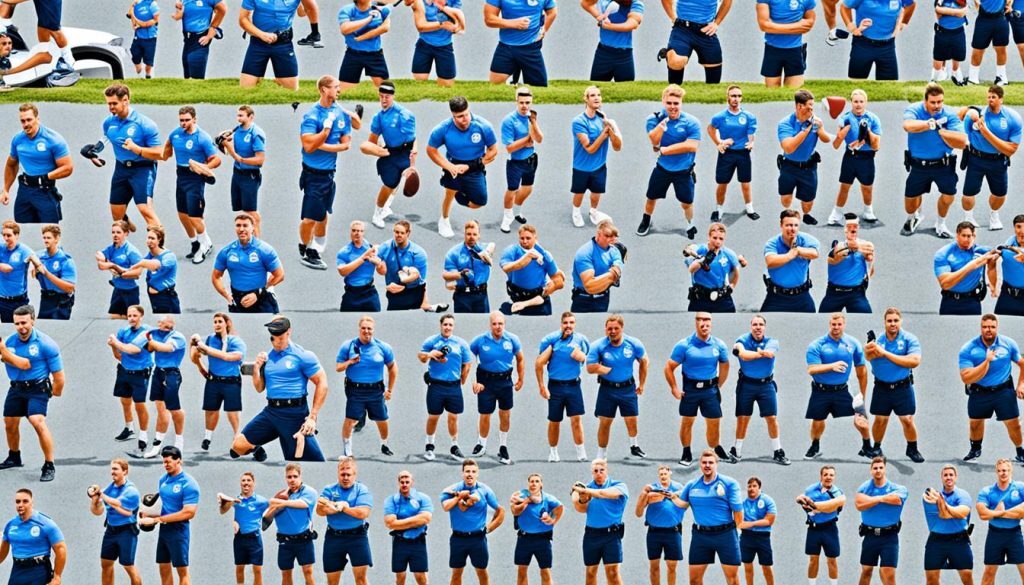
Navigating the Application Process
Applying to a police academy requires completing a thorough application process. Aspiring candidates must go through several stages to demonstrate their qualifications and suitability for a career in law enforcement.
The first step in the application process is submitting a resume and cover letter, outlining your education, work experience, and any relevant skills or certifications. This gives the selection panel an initial impression of your background and abilities.
Once your application is accepted, you will undergo a comprehensive background check. This involves verifying your personal, educational, and employment history, as well as conducting interviews with references and acquaintances.
After the background check, you will be required to complete reading and physical fitness exams. The reading exam assesses your comprehension skills, while the physical fitness exam evaluates your physical capabilities and endurance. These exams aim to ensure that candidates possess the necessary academic and physical aptitude for law enforcement.
In addition to the exams, candidates must undergo medical and psychological assessments. These evaluations are crucial to ensure that recruits are mentally and physically fit to handle the demands and pressures of the job.
The final stage of the application process is the entrance exam for the police academy. This comprehensive test assesses an applicant’s knowledge and skills in various areas relevant to law enforcement. It may include sections on criminal law, constitutional law, report writing, and situational judgment.
The application process can be lengthy, often taking several months to complete. However, it is a necessary part of selecting the most qualified candidates for the police academy.

| Application Process Steps | Description |
|---|---|
| Submit resume and cover letter | Provide an overview of your education and qualifications |
| Undergo background check | Verification of personal, educational, and employment history |
| Complete reading exam | Evaluate comprehension skills and knowledge |
| Take physical fitness exam | Assess physical capabilities and endurance |
| Undergo medical and psychological assessments | Evaluate mental and physical fitness for the job |
| Pass the entrance exam | Comprehensive test of knowledge and skills |
What to Expect at the Police Academy
Once accepted into the police academy, you can look forward to a comprehensive training program that will prepare you for a career in law enforcement. The police academy training is designed to equip recruits with the necessary skills and knowledge to serve and protect their communities.
The average duration of a police academy in Canada is 21 weeks, with some programs lasting over six months. During this time, recruits will undergo both classroom-based instruction and practical training to develop their understanding and abilities in various aspects of law enforcement.
The police academy curriculum covers a wide range of subjects that are crucial for effective policing. Recruits will receive training in areas such as:
- Firearms training
- First aid
- Criminal law
- Emergency vehicle operations
- Defensive tactics
- Investigations
- And more
These topics are essential for a well-rounded education in law enforcement and will help you develop the skills necessary to handle the challenges of the job.
Throughout your training at the police academy, you will be evaluated through written and practical exams to ensure you are progressing and applying your knowledge effectively. These exams serve as important milestones and provide valuable feedback on your performance.
Overall, the police academy training is intense and demanding, but it is also a rewarding and transformative experience. By the end of the program, you will be well-prepared to serve and protect your community as a police officer.
| Subject | Training |
|---|---|
| Firearms Training | Learn safe handling and use of firearms. |
| First Aid | Acquire essential life-saving skills and knowledge. |
| Criminal Law | Gain a thorough understanding of the laws and regulations that govern law enforcement. |
| Emergency Vehicle Operations | Learn how to safely operate vehicles in emergency situations. |
| Defensive Tactics | Develop skills for self-defense and apprehending suspects. |
| Investigations | Learn techniques for gathering evidence and conducting thorough investigations. |
| And More | Additional training in various other areas relevant to law enforcement. |
Preparing for Success in the Police Academy
Preparing for the police academy requires a combination of physical fitness, mental preparation, and studying for exams. To ensure you are ready for the challenges ahead, follow these tips:
Physical Fitness for the Police Academy
Physical fitness is a crucial aspect of becoming a police officer. The academy training is demanding, and recruits must be prepared to handle physical tasks and tests. To improve your fitness:
- Incorporate regular exercise into your routine, focusing on cardiovascular endurance, strength training, and flexibility exercises.
- Engage in activities that replicate the tasks you may encounter in law enforcement, such as running, circuit training, and practicing defensive tactics.
- Maintain a healthy diet to fuel your body and support your fitness goals.
Mental Preparation for the Police Academy
The police academy training can be mentally challenging, as recruits face high-pressure situations that require quick thinking and sound decision-making. To mentally prepare:
- Develop discipline and self-control to maintain composure in stressful situations.
- Practice problem-solving and critical thinking exercises to enhance your decision-making skills.
- Seek out opportunities to enhance your communication and interpersonal skills, as they are essential for effective law enforcement.
Studying for Police Academy Exams
Academy exams test your knowledge of various subjects related to law enforcement. To excel in your studies:
- Review the law and familiarize yourself with relevant legal procedures and practices.
- Create a study schedule and allocate time each day for focused learning.
- Obtain study materials and resources, such as textbooks, online courses, or study guides, to supplement your learning.
- Form study groups or seek guidance from experienced law enforcement professionals to gain different perspectives and insights.
| Physical Fitness Tips: | Mental Preparation Tips: | Studying for Exams Tips: |
|---|---|---|
| Incorporate regular exercise. | Develop discipline and self-control. | Review the law and legal procedures. |
| Focus on cardiovascular endurance, strength training, and flexibility exercises. | Practice problem-solving and critical thinking exercises. | Create a study schedule. |
| Engage in activities that replicate law enforcement tasks. | Enhance communication and interpersonal skills. | Obtain study materials and resources. |
| Maintain a healthy diet. | Form study groups or seek guidance. |
Tips for a Successful Application and Interview
If you’re considering applying to a police academy, it’s important to know how to make your application stand out from the rest. Here are some tips to help you increase your chances of success.
Highlight Relevant Experience
When applying to a police academy, make sure to emphasize any relevant work experience or volunteer work, especially if it is related to law enforcement. This could include jobs or volunteering with security companies, community policing initiatives, or organizations that promote public safety.
By showcasing your experience in the field, you demonstrate your commitment to law enforcement and your understanding of the responsibilities involved. This can make a strong impression on the selection committee.
Show Strong Moral Character and Integrity
Police academies value candidates with strong moral character and integrity. It’s important to convey these qualities throughout your application and interview process.
Be sure to highlight instances where you have demonstrated honesty, trustworthiness, and a commitment to upholding the law. This could include examples of ethical decision-making, integrity in personal and professional relationships, and a willingness to take responsibility for your actions.
Prepare for the Interview
The interview is a critical step in the police academy application process. To prepare for the interview, research common interview questions and practice your answers. This will help you feel more confident and articulate during the actual interview.
Dress professionally and arrive early for the interview. Pay attention to your body language, maintaining good posture and making eye contact with the interviewers. Listen carefully to the questions and take a moment to gather your thoughts before answering.
Showcase Strong Communication and Problem-Solving Skills
During the interview, it’s important to demonstrate your communication skills and problem-solving abilities. Police officers often need to communicate effectively with diverse individuals and handle challenging situations.
Highlight examples from your past experiences where you have effectively communicated, resolved conflicts, or found creative solutions to problems. This will show the interviewers that you have the skills necessary to succeed in a law enforcement career.
Remember, the goal of the application and interview process is to set yourself apart from other candidates and demonstrate that you have what it takes to succeed in the police academy. By following these tips, you can increase your chances of a successful application and ultimately stand out in the competitive field of law enforcement.
Next Steps After Graduating from the Police Academy
After successfully completing the police academy training, you will possess the necessary qualifications to pursue a fulfilling career as a police officer. With your training and education in place, you can now apply for job openings within your desired police department. This is an exciting opportunity to put your skills to use and make a positive impact on your community.
Becoming a police officer opens up a wide range of career opportunities. As you gain experience and prove yourself in the field, you may have the chance for advancement within the ranks. This can include positions such as a detective, sergeant, or even a leadership role in law enforcement.
Additionally, law enforcement agencies often offer specialized training programs for officers who want to specialize in areas such as forensics, narcotics, or community policing. These specialized roles can provide unique challenges and opportunities for personal and professional growth.
Law enforcement job prospects are promising, as there is a constant need for dedicated individuals to serve and protect communities. The demand for police officers remains relatively stable, and with the right qualifications and a passion for public service, you can build a rewarding and long-lasting career in law enforcement.
- Quebec Police Officer Salary Insights 2023 - July 13, 2025
- Canada Arrest Protocol: What Police Say Upon Arrest - June 12, 2025
- Can Police Disclose Who Reported You? Find Out Here - June 6, 2025
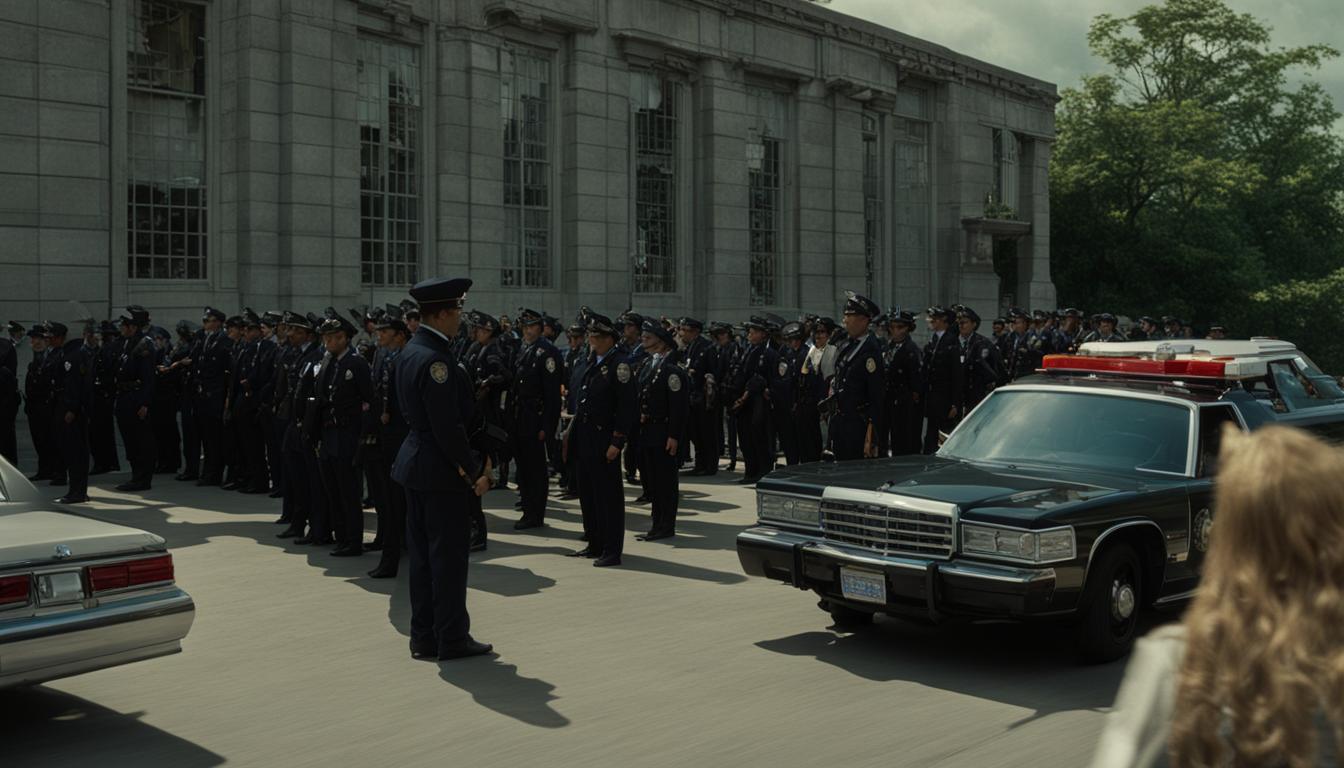




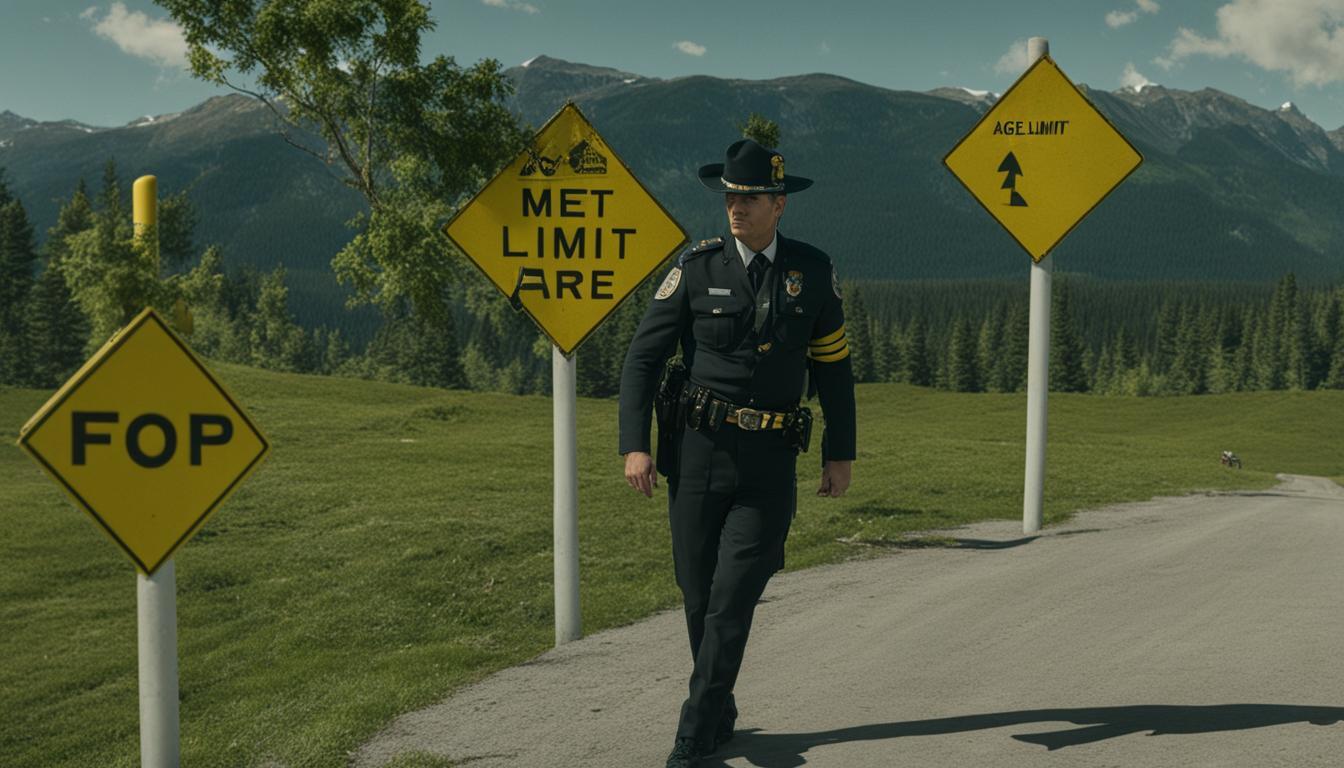



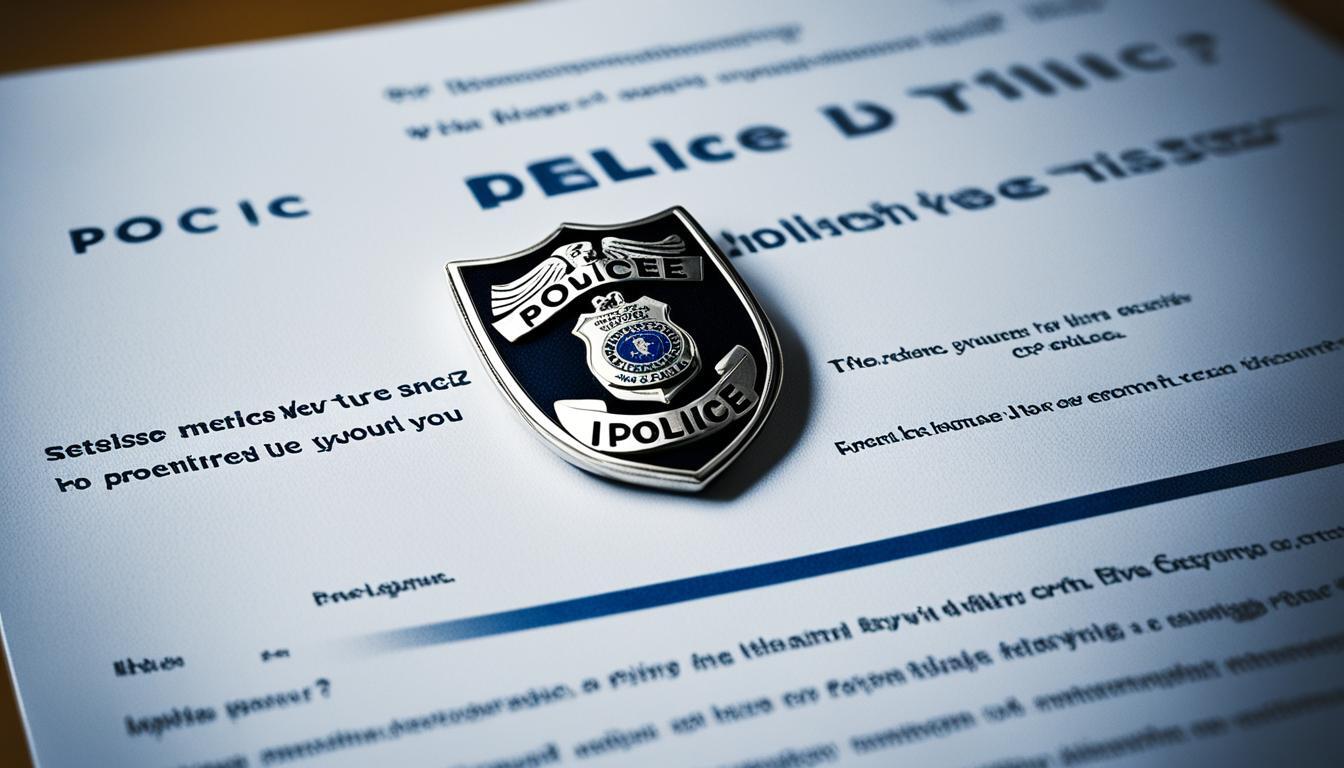









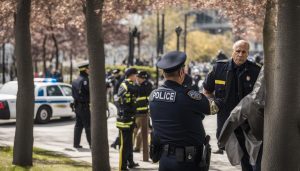
Post Comment